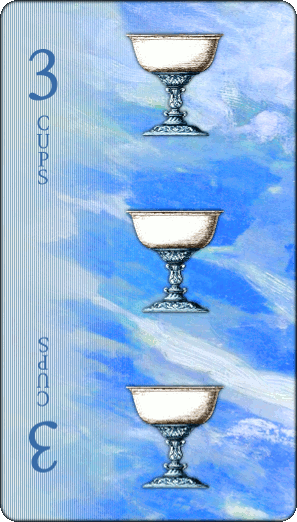
Three of Cups
Primary Element:
Water
Secondary Element:
Fire

Upright
- Games or sports played for wager or for fun.
- Gambling.
- A mood of hopeful anxiety surrounding an event — or, say, a political candidate — where wagers may be happening.
- A promising campaign speech, or a work of art that launches a career, which portends more good things to come.
- Something that pulls people to connect with a certain person or thing, or to take a side.
- A tenuous action based largely on intuition.
- A leap of faith.
The Three of Cups is Water (connection, affinity, joy, fulfillment, intuition) related to the element Fire (impulse, desire, danger, eruptions). It may signify any kind of game or sport, played for stakes or for its own sake.
This card may also signify a glimpse of potential, or a hint of something great to come. This is the speech that may set a political campaign in motion, or the writing sample which lands a book deal. Perhaps it could even be a bet on a sports team, for there is often a wager involved in recognizing potential success, and the outcome could hang anxiously in the air.
In connection with the above possible meanings, it could also mean a leap of faith, or a tenuous action based largely on intuition.

Abstract
(Reversed)
- Hatred, antipathy, prejudice.
- Countercurrents, having to go upstream.
- Oppressive systems. Lacking systematic privilege.
- Being hateful or prejudiced.
The Abstract Three of Cups is abstract Water (love, hate, emotions, deep compulsion) that pertains to the element Fire (destruction, raw power, impulse). This card can be thought of as the "countercurrent" card; it represents currents which are very difficult to fight against.
It may represent hatred seeks to repel and diminish that which it sets in its sights. It can be a natural reaction to something which is perceived to be harmful, or it can be intentionally cultivated. Hatred is a powerful and dangerous force which must be handled with care whether a person hates or finds theirself hated. Alongside the most powerful love or affinity, like that represented by the Abstract Six of Wands, it is one of the most blinding emotions.
Prejudice, while it doesn't necessarily stem from hatred, is a similar force which diminishes that which it targets and blinds people to the truth. Thorough systematic oppression oftentimes blinds people to the fact that they are prejudiced in the first place, which makes breaking the bonds of oppression that much more difficult.
When this card appears in a reading, it could signify that hatred, prejudice, or oppression must be faced in the world. It may also point to hatred and prejudice, or the fruits of widespread oppressive systems, arising within ones own psyche. Perhaps both are represented.
